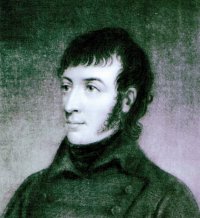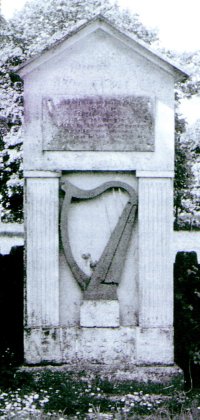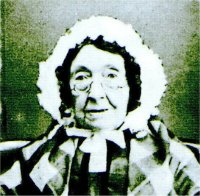 Downpatrick gaol's best known prisoner, Thomas Russell ("The Man From God Knows Where") was among the founders and a leading member of the United Irishmen. He was born in Drumahane, County Cork on 21 November 1767 and, following his family tradition of military service, joined the army in 1973 and was posted with the 52nd Regiment, to the Malabar coast of India. He returned to Ireland in 1776, on half pay and continued his studies in science, philosophy and politics. An Anglican, he was a vocal advocate of Catholic Emancipation, and a firm believer in the need for all Irish people to have fair opportunities for participation in public life. In July 1790 he met Theobald Wolfe Tone in the visitor's gallery in the Irish House of Commons and they became firm friends.
Downpatrick gaol's best known prisoner, Thomas Russell ("The Man From God Knows Where") was among the founders and a leading member of the United Irishmen. He was born in Drumahane, County Cork on 21 November 1767 and, following his family tradition of military service, joined the army in 1973 and was posted with the 52nd Regiment, to the Malabar coast of India. He returned to Ireland in 1776, on half pay and continued his studies in science, philosophy and politics. An Anglican, he was a vocal advocate of Catholic Emancipation, and a firm believer in the need for all Irish people to have fair opportunities for participation in public life. In July 1790 he met Theobald Wolfe Tone in the visitor's gallery in the Irish House of Commons and they became firm friends.
In 1790 Russell resumed his military career as a junior officer in the 64th Regiment of Foot and was posted to Belfast. With its thriving linen and textile industries and mercantile community, Belfast was called the "Athens of the North." As an officer of the garrison, Russell entered socially into the circles of the emerging professionals and businessmen. Their politics were radical; being Presbyterians, they were excluded from the Ascendancy.
The kinsmen and women of Belfast Presbyterians had figured prominently in the campaign for American independence, and they greeted the revolution in France, with its ideals of liberty, equality, and fraternity. Many were active in the anti-slavery movement. With his keen mind and radical ideas, Russell was soon drawn to the McCrackens, Simms, Templetons, Nielsons and other families who were to play a prominent role in the United Irish movement. With them he developed ideas of parliamentary reform, to include the bulk of the people, and Catholic emancipation.
By July 1791 Russell was out of the army and attending a convention of the Whig Club in Belfast to mark Bastille Day. The convention was addressed by William Drennan, who proposed a brotherhood that would "go further than speculate or debate … and come to grips with practicalities." He went as far as promoting separation from England and co-operation with the increasingly radical Catholic Committee, in Dublin, in the pursuit of political and social reforms. Many radical Ulster Dissenters were suspicious of Catholicism as a fundamentally conservative force that might easily be bought off with limited concessions. Russell told Tone of the Belfast developments, and within weeks Tone published his "Argument on Behalf of the Catholics of Ireland". Aimed principally at the Ulster Dissenters, Tone's pamphlet called for unity, fraternity, and tolerance, without which the government would "play upon terrors of Protestants, the hopes of Catholics and, balancing the one party by the other, plunder and laugh at the defeat of both." The Argument had a profound effect on its intended audience. Tone and Russell were invited by the Belfast radicals to assist in the task of establishing the proposed brotherhood, and on 18 October 1791 the inaugural meeting of the Society of United Irishmen took place, with twenty-eight people present. The society's three main aims were constitutional reform, union among the Irish people and the removal of all religious disqualificatons. Dublin quickly followed suit, and on 9 November, in the Eagle Tavern, Eustace Street the Dublin Society of United Irishmen was formed. The movement quickly developed a strategy of spreading its ideals by means of leaflets, newspapers, ballads, "catechisms," and travelling emissaries. The Northern Star of Belfast was especially successful, both commercially and politically.
The aim of Irish independence from Great Britain was a later development, when it became clear, through the Irish government's brutal repressive measures, that reform was not possible. That momentous decision (often taken to herald the birth of modern Irish republicanism) was taken in June 1795 on Cave Hill above Belfast by Wolfe Tone, Henry Joy McCracken, Thomas Russell, Samuel Neilsen and a number of other United Irishmen.
Russell's liberal views were tested to the full when, having retired from the army (he had to sell his commission to repay a debt for which he had been guarrantor), he was appointed Seneschal (magistrate) of the Manor Court of Dungannon in December 1791. He only lasted nine months. R.R. Madden's Memoire of Thomas Russell in his work United Irishmen 1846 says-
"October 15, 1792, Tone received a letter from Russell, stating that he was thinking of going to France, and requesting Tone to get letters of recommendation to mutual friends.....
"There can be no doubt that this determination was after the necessity he felt of retiring from his magisterial office; he resigned that office from conscientious feelings, having differed from his brother magistrates of the county respecting the mode of deciding questions between Catholics and Dissenters, and having publically stated on the bench that 'he could not reconcile it to his conscience to sit as magistrate on a bench where the practice prevailed of enquiring what a man's religion was before inquiring into the crime with which a prisoner was charged.' These words ought to be inscribed on Russell's tomb. At that period there were differences likewise between the linen merchants and the weavers, and the efforts of Russell to protect the latter caused him to be considered a man with dangerous leanings towards the people, in fact a republican"
An impressive feature of Russell's stance on freedom was its universal sweep. He made clear his anti-slavery views on more that one occasion. While at Dungannon he drew impassioned attention to the abuse in the Northern Star on March 17, 1792. An editorial comment took the less generous view -- agreeing with Russell but pointing out the immediate necessity to liberate three million slaves in Ireland. Russell did not make that distinction. As a veteran anti-slavery campaigner, Mary Ann McCracken remembered that as a young officer in Belfast Russell 'abstained from the use of slave labour produce until slavery in the West Indies was abolished, and at the dinner parties to which he was so often invited and when confectionery was so much used he would not take anything with sugar in it . . .'
From his position as librarian to the Society for the Promotion of Knowledge (later to become the Linen Hall Library), to which he was appointed in February 1794, Russell took an active part in organising the United Irishmen and by 1796 he was their commander in County Down. He was arrested in that year and lodged in Dublin's Newgate prison and as a consequence he took no part in the Rising of 1798 when the United Irishmen were defeated in military engagements in Counties Wexford and Antrim and in County Down at Ballynahinch. In March 1799 he, and the other state prisoners were transfered to Fort George in Scotland, an extensive fortress some miles north of Inverness. During his imprisonment he was never charged with any crime, being, in effect, a political prisoner. He was released in June 1802 and transported to Hamburg.
From Hamburg Russell made his way to Paris where he met Robert Emmet who was planning another insurrection. Russell returned to Ireland in March 1803 to organise the North. He soon realised the hopelessness of the cause when he failed to raise forces in the subdued County Down. When Emmet was arrested in Dublin, Russell went to his rescue but was captured and arrested.
Russell was brought to Downpatrick Gaol and tried for high treason with three local men, James Drake, James Corry and Michael Maguire. Found guilty on the evidence of many local witnesses, he was hanged and then beheaded at the gate of the gaol on 21 October 1803, one month short of his 37th birthday. In one of his final letters, written to Frank and Mary Ann McCracken in the week before his trial, he said-
"As to me I can only say that in the last moment of my Liberty I was not thinking of myself or acting for myself but for my Country. Politically I have done nothing but what I glory in, morally I acknowledge myself a grevious sinner. I trust for pardon and mercy thro' my saviour as I do most sincerely pardon all those who are about to take my life."
Writing to her brother, Dr William Drennan, some days after the execution, Mrs Martha McTier said
Wednesday, Cabin Hill, Belfast
I have not been in Belfast these six weeks. The subject there of late would have been very painful. Now I find it is mostly pity and admiration. To the last moment Russell's fortitude was conspicuous, his speech was eloquent and affecting. A Mr. Cole, a relation of the Kennedys and also of Russell's, repeated it, word for word, at Doctor Mattear's, as he said he never, never could forget it, the appearance, manner and voice of the man who uttered it. D. G[ordon] sat beside him, and as he had notes of his speech he either dropped or lost one (which, I suppose, was the occasion of what was called embarrassment). He said there would be a wrong account of it, and pointed out to Gordon the cause. The judge remarked (for he answered him) that he was sorry to hear him say he gloried in what he had done. He denied the word glory, and to the other observations of the judge he always bowed. There was no answer returned to his request of a few days at the time, but when he returned to prison he was told it would not be granted. The next morning Fulton was sent to him. He entered by saying he was sorry to. Russell told him he was sure of it, that he was quite ready. He received the Sacrament twice and went with him, bowed to some gentlemen he passed, and gave them his good wishes, directed the hangman in his office and put the rope round his neck himself. Gordon saw the book and the letter he left for his sister-affectionate and grateful and religious. Enthusiastic he did indeed appear; religious, he always was since I knew him, and in his late confinement it was not to be wondered at that such a mind as his might have grown even flighty. I rejoice in it, and that whatever it was- enthusiasm, fortitude or error- that it bore him up to the last. Few, few have I known like him."
 Following his execution he was buried in Down Parish Churchyard where Mary Ann McCracken, sister of Henry Joy McCracken (executed in 1798) and friend of Russell, arranged for a simple memorial. All it says is "The Grave of Russell"
Following his execution he was buried in Down Parish Churchyard where Mary Ann McCracken, sister of Henry Joy McCracken (executed in 1798) and friend of Russell, arranged for a simple memorial. All it says is "The Grave of Russell"
 The following description of Russell's personal appearance is of particular interest, it is said to have been written many years later from the treasured recollections of Mary Ann McCracken:
The following description of Russell's personal appearance is of particular interest, it is said to have been written many years later from the treasured recollections of Mary Ann McCracken:
"A model of manly beauty, he was one of those favoured individuals whom one cannot pass in the street without being guilty of the rudeness of staring in the face while passing, and turning round to look at the receding figure. Though more than six feet high, his majestic stature was scarcely observed owing to the exquisite symmetry of his form. Martial in his gait and demeanour, his appearance was not altogether that of a soldier. His dark and steady eye, compressed lip, and somewhat haughty bearing, were occasionally strongly indicative of the camp; but in general, the classic contour of his finely formed head, the expression of almost infantine sweetness which characterised his smile, and the benevolence that beamed in his fine countenance, seemed to mark him out as one, who was destined to be the ornament, grace and blessing of private life. His voice was deep-toned and melodious . . . His manners were those of the finished gentleman, combined with that native grace, which nothing but superiority of intellect can give. There was a reserved, and somewhat haughty, stateliness in his mien, which, to those who did not know him, had, at first, the appearance of pride; but as it gave way before the warmth and benevolence of his disposition, it soon became evident that the defect, if it were one, was caused by the too sensitive delicacy of a noble soul; and those who knew him, loved him the more for his reserve."
Mary Ann was exactly 20 years old when she and Thomas met. There is no doubt at all that she found him overwhelmingly attractive, for his "manly beauty", as well as for the strength and goodness of his character, but there is not the slightest hint that her feelings for him were in any degree reciprocated. Russell, for his part, during these early days in Belfast, met and loved another - the beautiful Bess Goddard. Her father was against any match, mainly it seems because Russell was a man without means or prospects. So his devotion was never to be reciprocated, or in any case never acknowledged as such, and she married another.
See also
Declaration of the United Irishmen - 1791
Report of the Trial of Thomas Russell - October 1803
Florence Wilson's ballad - The Man From God Knows Where
The Memory of the Dead - John Kelly Ingram
Down County Museum
Links:
The Linen Hall Library
The 1798 Rebellion in Ireland.
Further reading:
The Life and Times of Mary Ann McCracken 1770-1866: Mary McNeill
Journals and Memoirs of Thomas Russell: C.J.Woods
Thomas Russell and Belfast: Brendan Clifford
The United Irishmen-Republicanism, Radicalism and Rebellion: Edited by David Dixon, Dáire Keogh & Kevin Whelan
1798 Rebellion in County Down: Edited by Myrtle Hill, Brian Turner & Kenneth Dawson
The Man from God Knows Where. Thomas Russell, 1767 to 1803: Denis Carroll
A Man Stepped Out For Death: Edited by Brian S. Turner, 2003